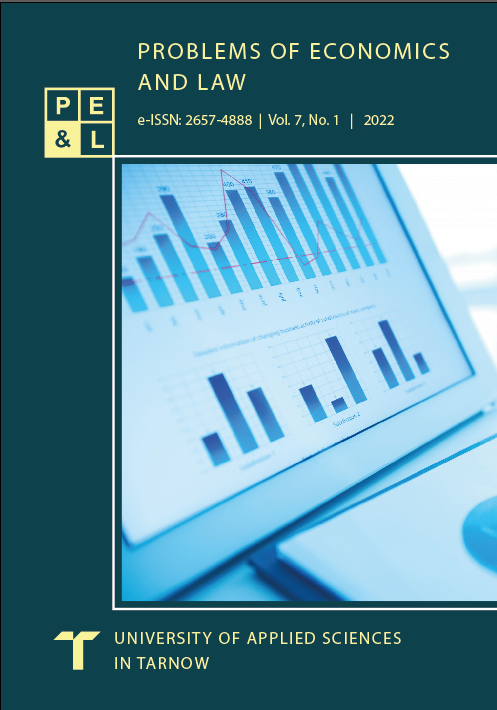Adult education as a factor in the development of human capital
DOI:
https://doi.org/10.55225/pel.446Keywords:
human capital, lifelong learning, increasing competences, vocational education, competitiveness, motivationAbstract
The article deals with the importance of human capital in the functioning of the economy, in particular of enterprises. The concept of human capital was presented, and attention was also paid to the diversity of definitions. The most space is devoted to the quality of human capital and ways of improving it, with particular emphasis on lifelong learning. The importance of competences was emphasized and the various instruments to improve them were presented. The theoretical considerations were supplemented with the analysis of statistical data illustrating the participation of adults in various forms of education in Poland and the EU.
Downloads
References
Bal-Woźniak, T. (2003). Kreowanie kapitału intelektualnego. Nierówności Społeczne a Wzrost Gospodarczy, 1, 141–150. Google Scholar
Becker, G. S. (1964). Human Capital. A Theoretical Analysis with special Reference to Education. New York: National Bureau of Economic Research. Google Scholar
Bielski, I. (2007). Zasoby ludzkie w przedsiębiorstwie innowacyjnym. Zarządzanie Zasobami Ludzkimi, 1, 9–20. Google Scholar
Bratnicki, M., Strużyna, J. (2001). Przedsiębiorczość i kapitał intelektualny. Katowice: Wydawnictwo Uczelniane Akademii Ekonomicznej im. Karola Adamieckiego. Google Scholar
Czarnik, S., Górniak, J., Jelonek, M. i in. (2021). Bilans kapitału ludzkiego: raport podsumowujący wyniki badań 2019–2020. Warszawa: Polska Agencja Rozwoju Przedsiębiorczości. Google Scholar
Eurostat. (2016). Classification of learning activities (CLA). Manual. Luxembourg: Publications Office of the European Union. Google Scholar
Eurostat. (2022). Participation rate of employees in education and training (last 4 weeks) by sex, age and occupation. W: Eurostat: Data Browser. Dostępny w Internecie: https://ec.europa.eu/eurostat/databrowser/view/trng_lfs_04/default/table?lang=en [dostęp: 2022-09-05]. Google Scholar
Giza-Poleszczuk, A., Marody, M., Rychard, A. (2000). Strategie i system. Polacy w obliczu zmiany społecznej. Warszawa: Wydawnictwo IFiS PAN Google Scholar
Górniak, J., Strzebońska, A., Worek, B. (2019). Rozwój kompetencji: uczenie się dorosłych i sektor rozwojowy. Warszawa: Polska Agencja Rozwoju Przedsiębiorczości. Google Scholar
Griffin, R. W. (2007). Podstawy zarządzania organizacjami. Warszawa: Wydawnictwo Naukowe PWN. Google Scholar
Grotowska-Leder, J. (2014). Rzecz o kształceniu dorosłych. Lifelong learning w Polsce, w perspektywie Unii Europejskiej. Acta Universitatis Lodziensis. Folia Sociologica, 50, 117–135. Google Scholar
Haber, L. H. (1996). Managment. Zarys zarządzania małą firmą. Kraków: Wydawnictwo Profesjonalnej Szkoły Biznesu. Google Scholar
Krzysztofek, A., Kumańska, W. (2011). Wpływ motywowania pracowników na efektywność pracy w przedsiębiorstwie. Studia i Materiały. Miscellanea Oeconomicae, 15(2), 41–52. Google Scholar
Majowska, M. (2004). Problemy badania wpływu kapitału ludzkiego na zachowania przedsiębiorcze. W: M. Juchnowicz (red.). Kapitał ludzki a kształtowanie przedsiębiorczości. Warszawa: Poltext. Google Scholar
Perceptions on adult learning and continuing vocational education and training in Europe: Second opinion survey: Vol. 1 Member States. Luxembourg: Publications Office. CEDEFOP reference series, No 117. Dostępny w Internecie: http://data.europa.eu/doi/10.2801/6647 [dostęp: 2022-08-08]. Google Scholar
OECD. (2001). Lifelong learning for all. Policy directions. Dostępny w Internecie: http://www.oecd.org/officialdocuments/publicdisplaydocumentpdf/?cote=DEELSA/ED/CERI/CD(2000)12/PART1/REV2&docLanguage=En [dostęp: 2022-09-04]. Google Scholar
Penc, J. (1998). Motywowanie w zarządzaniu. Kraków: Wydawnictwo Profesjonalnej Szkoły Biznesu. Google Scholar
Sekuła, Z. (2008). Motywowanie do pracy. Teorie i instrumenty. Warszawa: Polskie Wydawnictwo Ekonomiczne. Google Scholar
Strużyna, J. (2002). Obrazy kapitału całkowitego firmy. Organizacja i Kierowanie, 1, 99–106. Google Scholar
UNESCO. (2012). International Standard Classification of Education ISCED 2011. Montreal: UNESCO Institute for Statistics. Google Scholar
US. (2012). Kształcenie zawodowe w przedsiębiorstwach w Polsce w 2010 r. Gdańsk: Urząd Statystyczny w Gdańsku. Google Scholar
Ustawa z dnia 14 grudnia 2016 r. Prawo oświatowe. T.j. Dz.U. z 2021 r., poz. 1082. Google Scholar
Ustawa z dnia 20 kwietnia 2004 r. o promocji zatrudnienia i instytucjach rynku pracy. T.j. Dz.U. z 2022 r., poz. 690. Google Scholar
Downloads
Published
How to Cite
Issue
Section
License
Copyright (c) 2022 Dorota Koptiew, Bogusława Puzio-Wacławik

This work is licensed under a Creative Commons Attribution-ShareAlike 4.0 International License.





